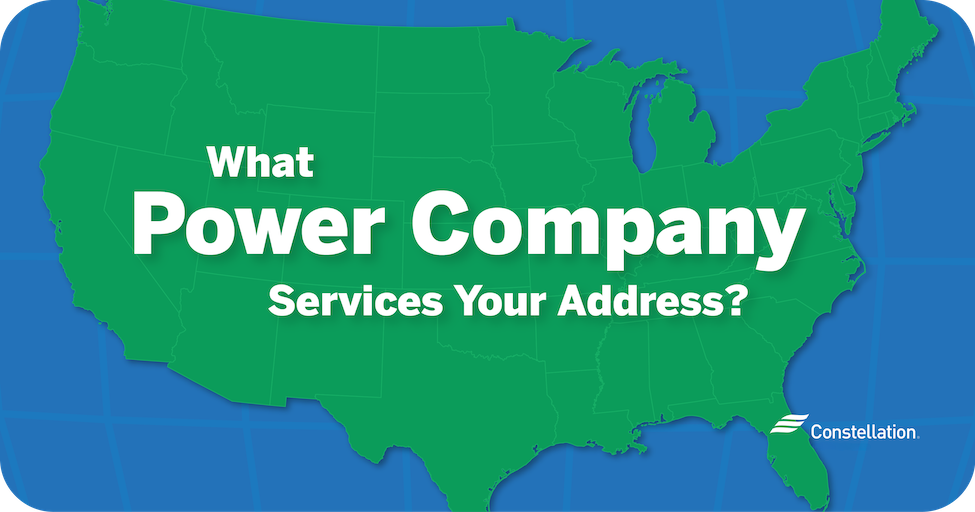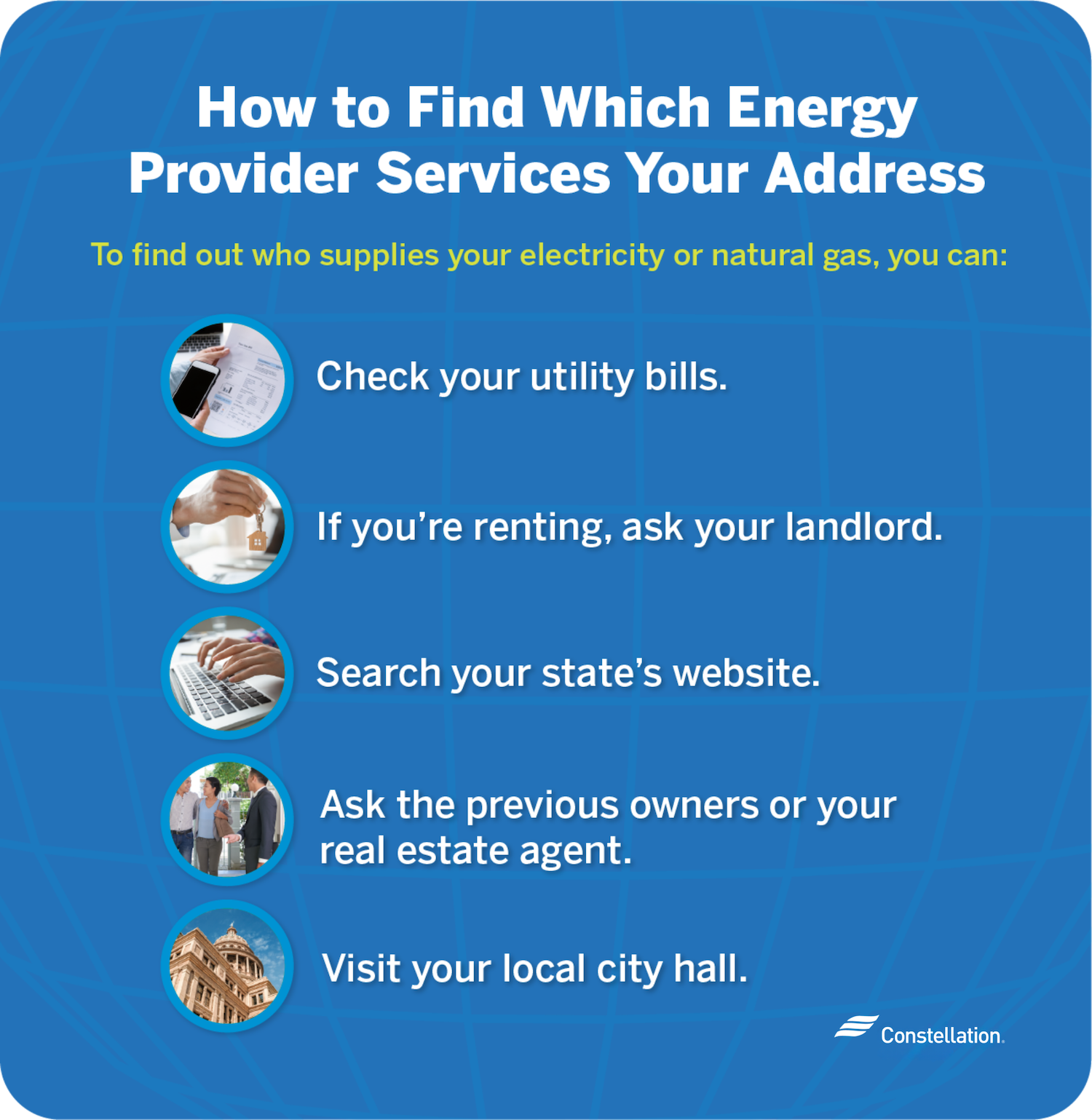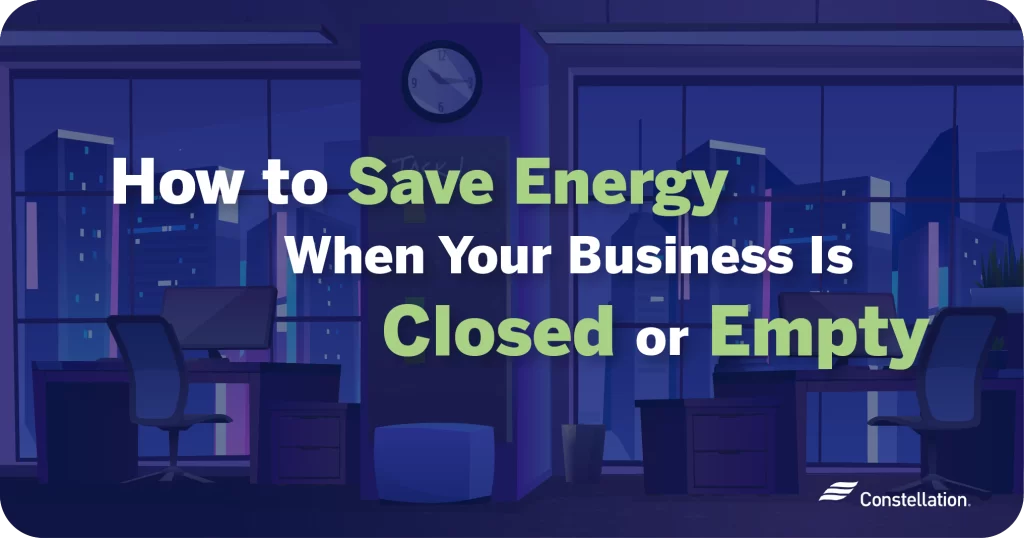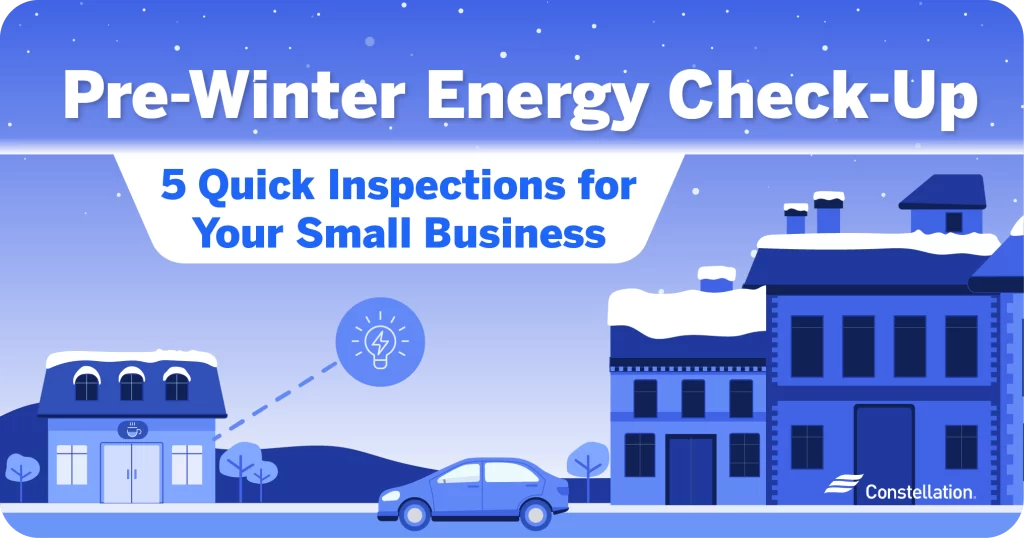
- Category:
Energy Choice -
Last updated:
June 30, 2025
Who Is My Gas and Electricity Provider?
If you’re responsible for paying the bills in your home, you’re familiar with utilities like electricity, natural gas and water. But if you’re moving into a new place, for instance, you
may not know the utility companies for your address yet. And you may be wondering, “Who is my electric company?”
In the United States, you can find utilities by address fairly easily. Most addresses still tie to a single distribution utility, though the power itself can come from multiple retail suppliers or, in community-choice aggregation (CCA) areas, from the municipality’s chosen provider. In some states, you’ll need to select an electricity or natural gas provider.
Constellation now supplies retail electricity or natural gas in 16 states plus Washington, D.C. To find out if Constellation is an energy supplier in your state, enter your ZIP code below and start comparing rates.
Your state or municipality may allow energy choice
Over the years, some states and towns in the U.S. have deregulated their energy markets. In those places, customers can choose their energy supplier. That leads to competition and, often, lower prices or value-added services.
As of 2025, full electricity retail energy choice is available in 15 states (including Texas, Ohio, Illinois, Connecticut, and Maryland), while more than 20 states (including Georgia, Michigan, and New Jersey) support natural gas choice. A handful (such as Pennsylvania, Massachusetts, Ohio, and Maryland) allow you to shop for both commodities. See the full list of deregulated electricity and natural gas states below.
- Electricity deregulation: Connecticut, Delaware, Illinois, Maine, Maryland, Massachusetts, Michigan (partial), New Hampshire, New Jersey, New York, Ohio, Pennsylvania, Rhode Island, Texas, and Washington, D.C.
- Natural gas deregulation: California, Georgia, Illinois, Indiana, Maryland, Massachusetts, Michigan, New Jersey, New York, Ohio, Pennsylvania, and Virginia (extent and availability vary by utility).
In these markets, your energy provider may be a different company than the local utility. Basically, the utility is responsible for delivering your energy. The retail energy provider supplies your energy and helps you secure the rate you pay for electricity or natural gas.
So, if you live in a place that has energy choice, it can pay to shop around. You’ll want to find an electricity and/or natural gas provider with an energy plan and pricing that meets your needs. In some states, like Texas, you can choose your electricity provider.
In other states, like Georgia, you can choose your natural gas provider. And some states, like Pennsylvania and Massachusetts, allow residents to choose both electricity and natural gas providers. If you’re not sure whether your state offers energy choice, one way to find out is by contacting your local utility or state regulatory commission.

Who is your electricity supplier?
There are several ways to find your electricity provider. If you don’t have energy choice, try one of the options below to find the utility company that services your address:
- Find your electricity bill. Your recent electricity bill will have the total amount due broken out into line items. Look for the item or section that says, “electric supply charges,” “supply services” or something similar. If you have a separate electricity supplier, the name of the provider will be listed there. You may also be billed directly by the electricity provider.
- If you’re renting, ask your landlord. Depending on the terms of your lease, you may be responsible for paying the electric bill. When you sign the lease, ask your landlord about utility companies for your address and whether you have a choice in electricity providers.
- Search your state’s website. Your state may have an energy section on its website that can give you more information about electric utilities and suppliers by address. You may also get answers by contacting your local utility or state regulatory commission.
- Ask the previous owners or your real estate agent. If you’re buying a home, don’t wait until you move in to find out who your electric company is. During the closing process, reach out to your real estate agent or the seller’s agent to find the utility companies for the address you’re moving to. And don’t forget to ask if there’s a separate supplier. It’s never too early to try to find an electricity provider for your new home.
- Visit your local city hall. You may be able to find your local utility by contacting your town hall or municipal building. They can also tell you if your area has energy choice.
What natural gas provider services your address?
To find the natural gas supplier for your address, follow any of these steps:
- Search your natural gas bill. Look for a line item or section labeled “natural gas supply,” “gas supply charges” or something similar. You can find the name of the natural gas provider for your address there. Your supplier may also bill you directly.
- Ask your landlord or the former owner. As you get close to signing either a lease or closing documents, ask whether your new home uses natural gas. If it does, ask who the natural gas utility is for the address and if you have a choice in natural gas suppliers.
- Contact your state or local government. Your state’s website and/or your town hall may be able to give you more information on natural gas providers in your area.
How to find out which energy plan you have
Once you have a better understanding of your utility and energy supplier options, you can use your energy bill to get a sense of the pricing of your energy plan. Electricity plans are quoted in cents per kilowatt-hour (¢/kWh). Retail natural gas plans typically use dollars per therm or per dekatherm (Dth).
When you identify your energy supplier, call their customer service number to find out the energy plan for your address. You may also be able to contact your provider online. If you or someone in your household set up the plan, you may be under a contract for a set price over a set time period. When a fixed-term contract ends, many suppliers shift you to their standard-offer service, which can be either variable or a short-term fixed rate, so review renewal notices carefully.
If you don’t have immediate access to your energy bill or contract, these clues can help you figure out the kind of plan you might be on:
- You’re probably on a fixed-rate plan if:
- The price you’re paying per kWh does not change month to month.
- Any documentation on your welcome letter, confirmation email or bill mentions the words “rate lock” or “fixed rate.”
- You’re paying the same energy supply rate, no matter the season.
- You’re probably on a variable-rate plan if:
- What you pay per kWh changes each month, even if you use the same amount of electricity.
- You’re past your contract end date and haven’t set up a new plan. Many suppliers will put you on a variable rate plan after your contract ends.
- You’re probably on a time-of-use plan if:
- You see your electricity bill broken into time periods, blocks or tiers labeled with names like “on-peak,” “off-peak” or “mid-peak.”
- You signed up for a plan that discounts the cost of a kWh during specific times or days.
- Your energy provider or utility offers something called “TOU” pricing.
How do I find my kWh cost?
You can find your cost per kWh by checking your electricity bill. Look for a number labeled “electric supply charge,” “energy charge” or “rate per kWh.” It might appear as cents (¢) per kWh. Energy suppliers must clearly display the price they’re charging per kWh to make it easy for you to compare your options.
Choosing the best energy provider for your needs
If you live in a place with energy choice, you may be able to sign up for a different energy plan for your home. But price is just one factor to think about. You’ll also want to consider contract length, the company’s reputation, customer service and any additional taxes or fees that might be added. Knowing your energy habits and needs — and how they might be best served — will guide you in choosing the best energy supplier for you.
Constellation provides electricity and/or natural gas to customers in Texas, Georgia, Ohio, Pennsylvania, Massachusetts, Maryland and more. View our current fixed-rate plans and decide if switching to Constellation is right for you. With a little research, you can rest assured that you’re getting the most competitive rates on electricity and natural gas.




